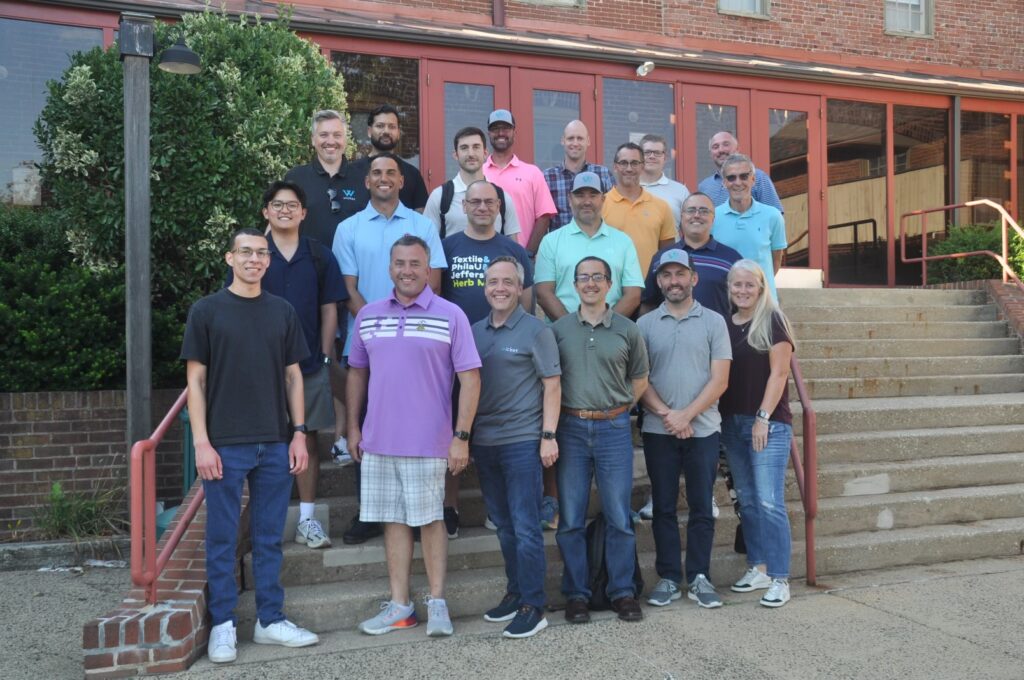
Executive Team: Alastair Partington, Jeff Boehm, Rob Seaner, Ryan Owen, Glenn Borgmann, Samson Timoner, Jeff Josephson
Founding: 2020
Mission: Enabling the Sensational Event Experience
Employees: 40 & 15% Local
Workplace: Hybrid
Stage & Capital Raised: Growth & <$10M raised
Investors: Private Investors / Family Office Capital
Key Customers: Cleveland Browns, Atlanta Falcons, New York Mets
Glassdoor Rating: N/A
Valuation (estimated): <$100M
^ this is a useless number from MGMT Boston. There is no tangible valuation until the business is sold or goes public. Don’t forget it!
Wicket is building advanced facial recognition software technology to make the live event experience better. This team is changing the stadium experience so fans can get to their seats faster, enjoy themselves, and stadiums get to improve their operational rigor too. That’s a win-win.
The Founders of Wicket owned a portfolio of sports media & marketing products through a prior business called ISM Connect. When COVID hit, they were approached by the Cleveland Browns (and their Dawg Pound) with an opportunity to help get fans back into the stadium safely within proper social distancing guidelines.
The team had been developing facial recognition technology and worked quickly to apply it to this new, specific experimental use case. They built a solution and the Cleveland Browns became one of the first major sports teams to successfully allow fans back into the stadium in September of 2020.
Wicket’s initial product was an app on an iPad. Ahead of the game customers (the ticket holder) would go to a website, take a selfie, and login to their Ticketmaster account to enroll. So when you showed up to the game the iPad recognized your facial signature and the tickets associated with your account to get into the game. Magic!
Soon they added Mercedes Benz Stadium (home of the Atlanta Falcons and Atlanta United) and Citi Field (home of the Mets). Wicket had a compelling value proposition, customer momentum, and became a standalone startup to allow safe access for patrons who didn’t have to take out their phones and talk to a ticket taker. Then a funny thing happened. Things were flowing faster. The convenience factor was unmistakable.
The North America live sports market is due to reach $20B by 2028 and the overall live events market is $300B+ growing to $600B+ over that same time frame (src). Have you seen some of these new quarterback contracts? It’s a gigantic opportunity.
Wicket’s technology is getting fans into stadiums 4x faster, allowing stadiums to sell more concessions, and reduce their operational overhead all in the same breath. Data shows that every Wicket ticketing lane saves $8,000 in annual infrastructure costs. Concession revenue from Wicket run stadiums is showing a 170% ROI in their first year. Some stadiums are already operating 25-30 Wicket lanes. You do the math! Someone call Bob Kraft!
Now their facial ticketing product suite has continued to expand. Wicket supports 30+ teams across major league sports, went live with the U.S. Open for the USGA at Pinehurst, and the Australian (Tennis) Open down in Oz. They support 30-35 stadiums of the 153 sports teams in the top 5 North American sports leagues. Even Salesforce’s Dreamforce conference is using Wicket as they have expanded from ticketing to credentialing and handling payments using facial recognition technology.
On the security front, teams and venues spend millions annually in security infrastructure. Did you see that COPA America Final down in Miami..? Wicket can help secure locker rooms and playing fields across their 1.5M safe entrances, with a 100% positive identification rate to date. Just recently the NFL announced that all 32 teams will be using Wicket to secure gameday playing fields, locker rooms, and press boxes.
Today, sports & live events represent 80% of revenue and the majority of Wicket’s customer focus. Europe will be a critical geographic expansion area in the coming years. In the future, sectors like corporate access control & aviation are growth opportunities. Higher education is an interesting use case too. Any place someone needs to be verified gives the Wicket marketing & product team opportunities for development.
Wicket is a SaaS business and a typical stadium package might include 30 ticketing lanes, 20 concession kiosks, and 20 access control doors. Larger customers will sign venue wide Enterprise deals. Wicket plans to remain a free service to fans and siloes all data by customer.
Their product team has developed best in class proprietary facial recognition algorithms with full control over what happens with the data and testing. Their integrations with the major ticketing platforms, POS systems, and credentialing products help the team tie it all together as the experts in sports & live entertainment. There are certainly other facial recognition technologies out there. But their biggest competitor is truly the “status quo”. And Wicket has their technology deployed into more stadiums than all of their competitors combined.
In 2024 Wicket has grown to 40 team members and they’re looking to add another 15 team members globally by the end of the year. Headquartered in Cambridge, their main presence is split between Doylestown, PA and Cambridge (in the CIC). Their R&D team is split between Cambridge, Doylestown, and Poland and they have remote employees to support their expanding customer footprint too.
At the end of June Wicket has exceeded 2023’s entire revenue figure (which was already a seven figure year). This coming pre-season Wicket will be used in every NFL stadium. So far…every Wicket stadium customer has continued to expand their use case.
Operators to Know:
- Bob Banks, VP Engineering
- Kelly Bucey, Technical Product Manager
- Tamara Camacho, Marketing Manager
- Jason Meeks, Director of Product Marketing
- Brad Soricelli, Security Director
- Adam Spaulding, Head of Product
- Samson Timoner, Head of Computer Vision
My investigative powers continue to need work so apologies to the Wicket team I know I missed many up & coming operators internally
Key Roles To Be Hired:
If I were interviewing here are some questions I’d ask:
- Could you share some details about Wicket’s competitive differentiation and GTM strategy?
- What are the biggest challenges as you scale the team geographically & across verticals?
- What is the growth plan for the next 12-24 months?
- What are the most important roles (and teams) you’ll be looking to add to in 2024?
We’re optimizing for readability here so to learn more about Wicket you’ll have to D.Y.O.R. I’m excited to watch this team bring more fans into the digital age. All audiences applaud your efforts. See you around town and stadiums across North America!
